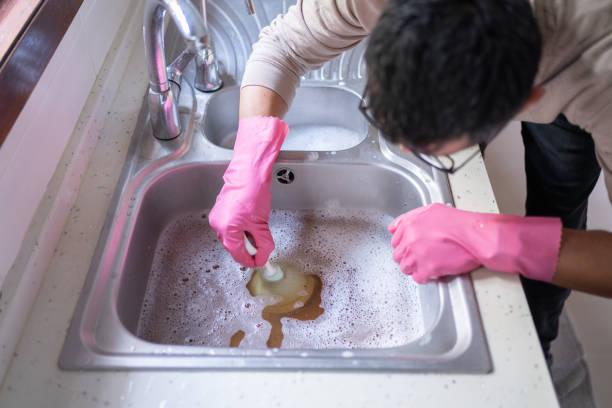How to Clean Clogged Drains with Baking Soda and Vinegar

Clogged drains are a common household nuisance that can lead to frustration, unpleasant odors, and costly repairs if left untreated. Whether it’s the kitchen sink, bathroom drain, or shower, blockages can occur for various reasons—from grease buildup to hair and soap residue. Many homeowners reach for harsh chemical cleaners, but there is an eco-friendly, safe, and effective alternative: baking soda and vinegar.
Before diving into the cleaning process, it's crucial to understand the causes of clogged drains. Blockages can happen anywhere in the home, but learning the common triggers can help prevent recurring problems. If you frequently encounter drainage issues, you might benefit from this helpful plumbing problems guide that covers common residential plumbing issues and solutions. This knowledge can help you take proactive steps to prevent recurring blockages.
Why Do Drains Get Clogged?
Drains commonly clog due to the gradual buildup of materials like food particles, grease, soap scum, hair, and mineral deposits. In kitchens, fats and oils solidify inside pipes, creating sticky blockages. In bathrooms, hair and soap residue form stubborn clogs that restrict water flow. Over time, these issues can lead to slow draining sinks, backups, and even pipe damage.
Understanding what causes clogged drains is crucial for prevention. Consistent maintenance and early intervention can help you avoid costly repairs and plumbing emergencies down the line.
The Science Behind Baking Soda and Vinegar for Clogged Drains
Baking soda (sodium bicarbonate) is a mild alkaline compound, while vinegar contains acetic acid. When combined, they produce carbon dioxide gas, creating the fizzing action that can help loosen debris inside pipes. This chemical reaction can break down light clogs and refresh smelly drains.
While this method isn't a cure-all for major plumbing blockages, it's highly effective for minor clogs and routine maintenance. It's also environmentally friendly and safe for most plumbing systems, making it a preferred choice for eco-conscious homeowners.
Step-by-Step Guide to Cleaning Clogged Drains Naturally
-
Boil Water: Start by pouring a pot of boiling water down the clogged drain to loosen any grease or soap buildup.
-
Add Baking Soda: Pour about half a cup of baking soda directly into the drain.
-
Add Vinegar: Follow with half a cup of white vinegar. Quickly cover the drain with a plug or cloth to contain the fizzing reaction.
-
Wait: Allow the mixture to sit for 15-30 minutes. The bubbling helps break down grime and buildup.
-
Flush with Hot Water: Finish by flushing the drain with another pot of boiling water to wash away loosened debris.
This process is simple, cost-effective, and non-toxic, making it an excellent option for regular drain maintenance.
When to Call a Professional Plumber
While the baking soda and vinegar method works for minor issues, some clogged drains require professional intervention. If you notice:
- Water backing up in multiple fixtures.
-
Persistent slow drainage despite home remedies.
-
Strong, unpleasant odors that don't resolve.
-
Gurgling or bubbling sounds in drains.
These signs indicate deeper issues that need expert attention. Homeowners in need of reliable plumbing services can count on 2Ton Plumbing for professional help with stubborn clogs and other plumbing concerns.
Preventive Tips to Avoid Clogged Drains
Simple prevention can save you from the hassle of clogged drains:
-
Never pour grease or oil down kitchen sinks.
-
Use drain screens to catch hair and debris.
-
Flush drains with hot water regularly.
-
Dispose of coffee grounds, food scraps, and fibrous waste in the trash, not the sink.
-
Schedule periodic plumbing maintenance with trusted professionals.
These everyday habits can dramatically reduce the frequency of drain blockages and keep your plumbing system functioning optimally.
FAQs
Q1. Can baking soda and vinegar damage my pipes?
No, baking soda and vinegar are safe for most modern plumbing, including PVC pipes.
Q2. How often should I clean my drains with baking soda and vinegar?
Doing this once a month can help prevent buildup and keep drains fresh.
Q3. What should I do if this method doesn’t work?
If the clog remains, it may be time to contact a professional plumber for a thorough inspection and repair.
Q4. Is baking soda and vinegar effective for all types of clogs?
This method is best for minor clogs. Major blockages or foreign objects usually require professional removal.
Q5. Are chemical drain cleaners better than natural methods?
Chemical cleaners can work faster but may damage pipes over time. Natural solutions like baking soda and vinegar are safer and more environmentally friendly.
- Art
- Causes
- Best Offers
- Crafts
- Dance
- Drinks
- Film
- Fitness
- Food
- Giochi
- Festival
- Gardening
- Health
- Home
- Literature
- Music
- Networking
- Altre informazioni
- Party
- Religion
- Shopping
- Sports
- Theater
- Wellness



